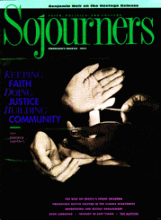Something is happening that we dare not miss. In many places and circumstances, a new ecumenical community is emerging, radically rooted in faith and deeply committed to justice. People and groups from diverse traditions, who have not been connected before, are discovering how much they need each other. Together, they are forging a practice of faith in action that can genuinely be called prophetic; and, together, they are harbingers for a more prophetic church.
As hopeful as this development is, it is, indeed, easy to miss. In fact, many who are making it happen actually feel alone. In our families and local environments, it's hard to see or feel connected to the wider community even when we know it exists.
It's not easy to put your faith together with your life, or really do something about justice, or seek to care for the Earth. Sometimes we are just overwhelmed.
I know how hard it is to resist the temptation to lose hope. Particularly in the difficult time since the Gulf war, many who seek peace and pursue justice have done much soul-searching.
However, one of the blessings of all the traveling I do is that I get to meet so many of our readers and friends. I see your lives--your work, your families, your communities, your struggles. What makes me feel so close to you and so grateful for you is the integrity of those struggles. What I see convinces me that there is much more going on in this country (and around the world) than meets the eye, and certainly than ever makes the evening news.
What's happening? A remarkable number of people are going about the business of keeping faith, doing justice, and building community. It's not always magnificent, visible, or immediately effective. But it is happening, it is faithful, and it is profoundly important to the future.
Read the Full Article

